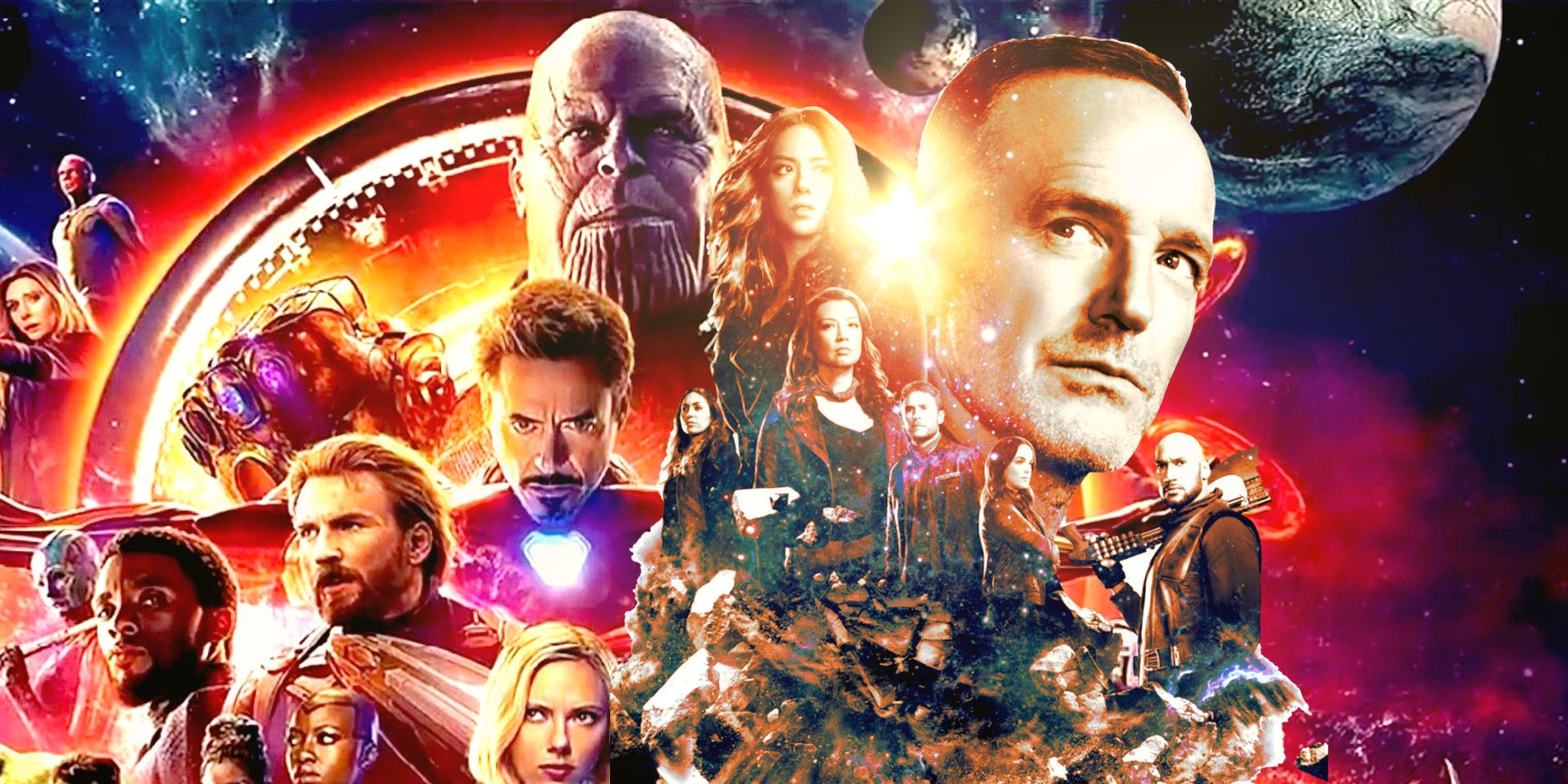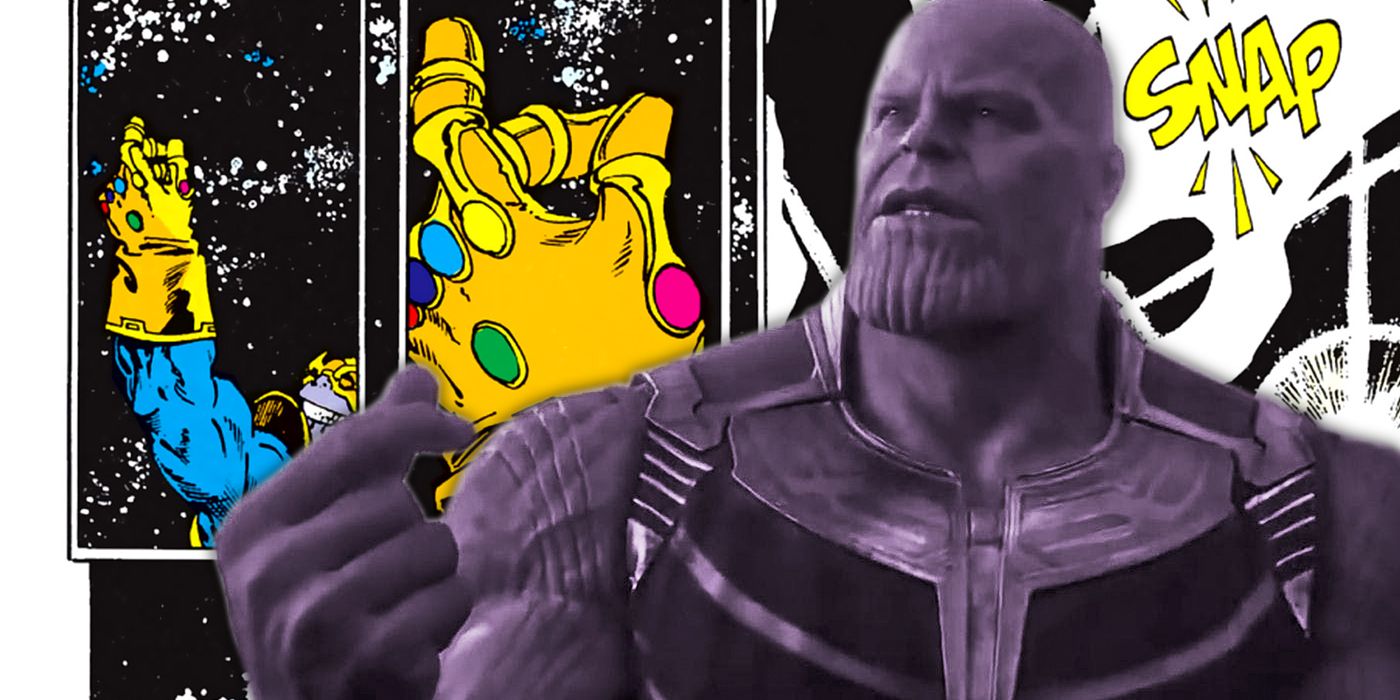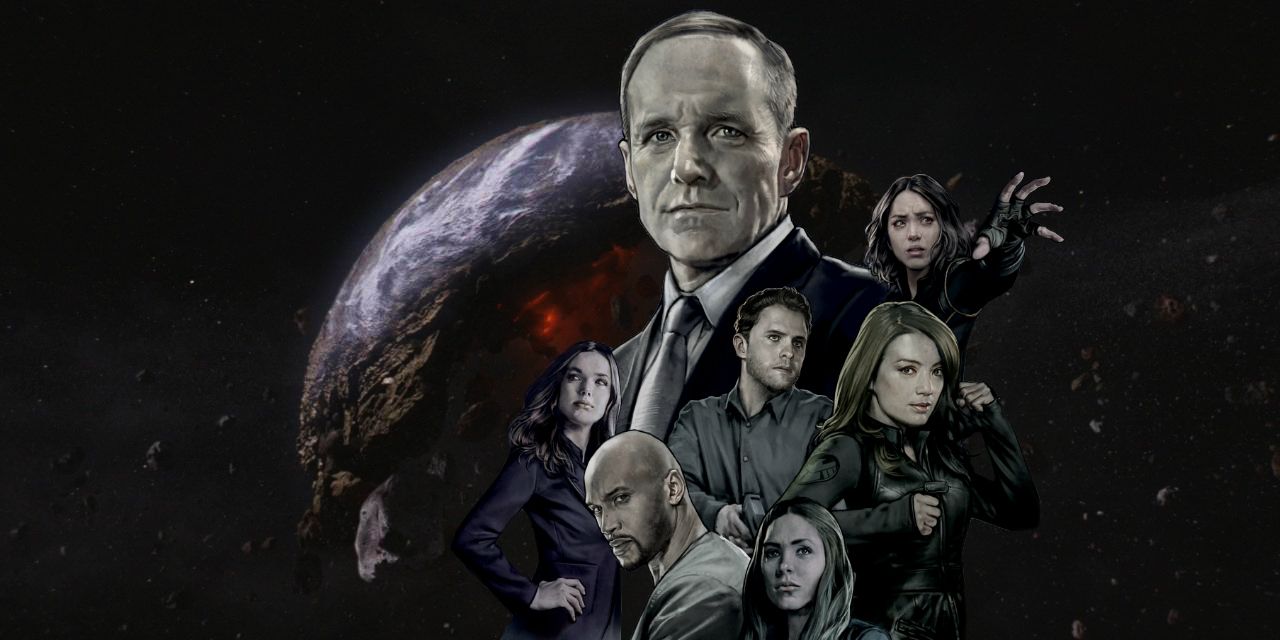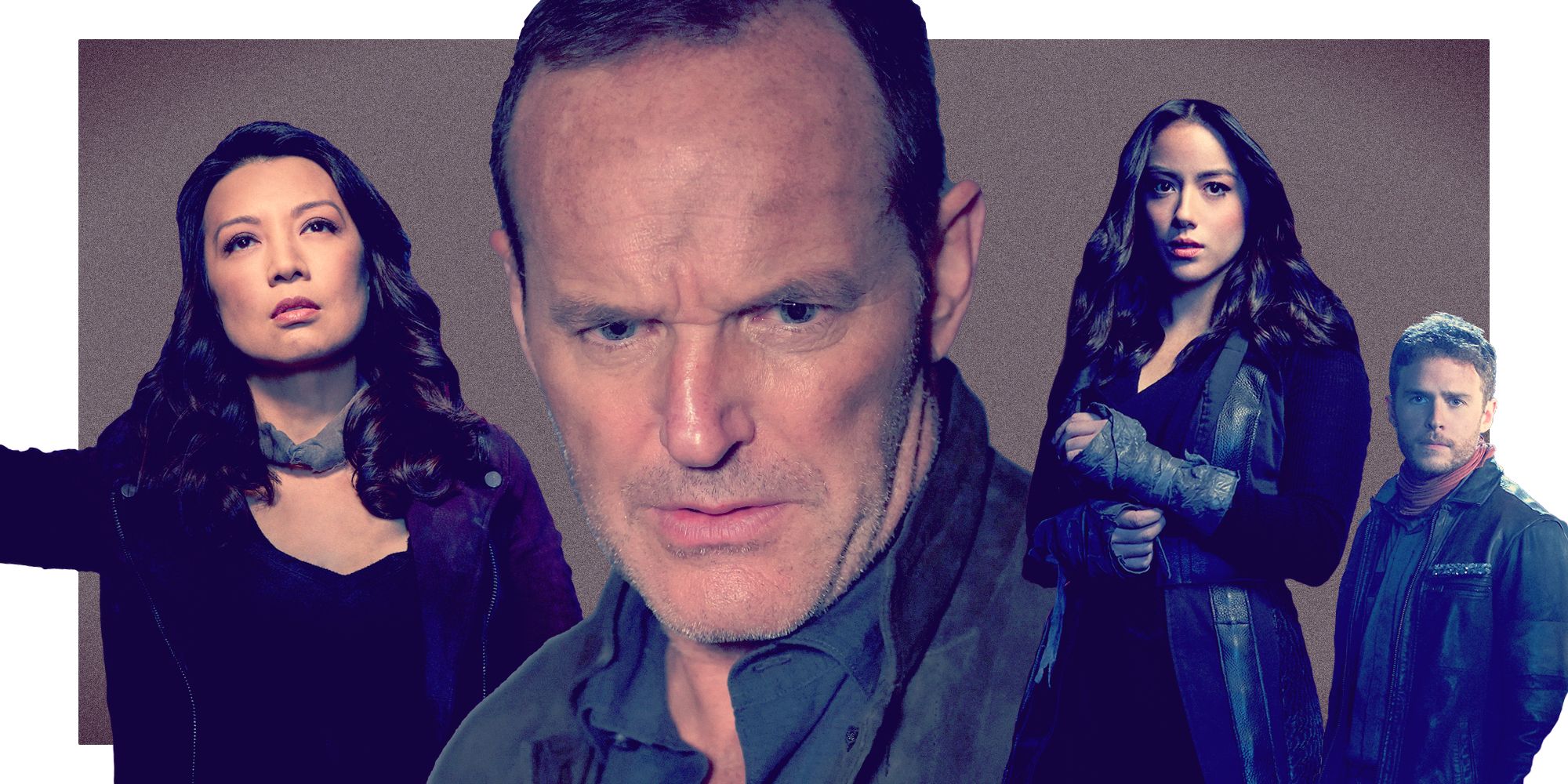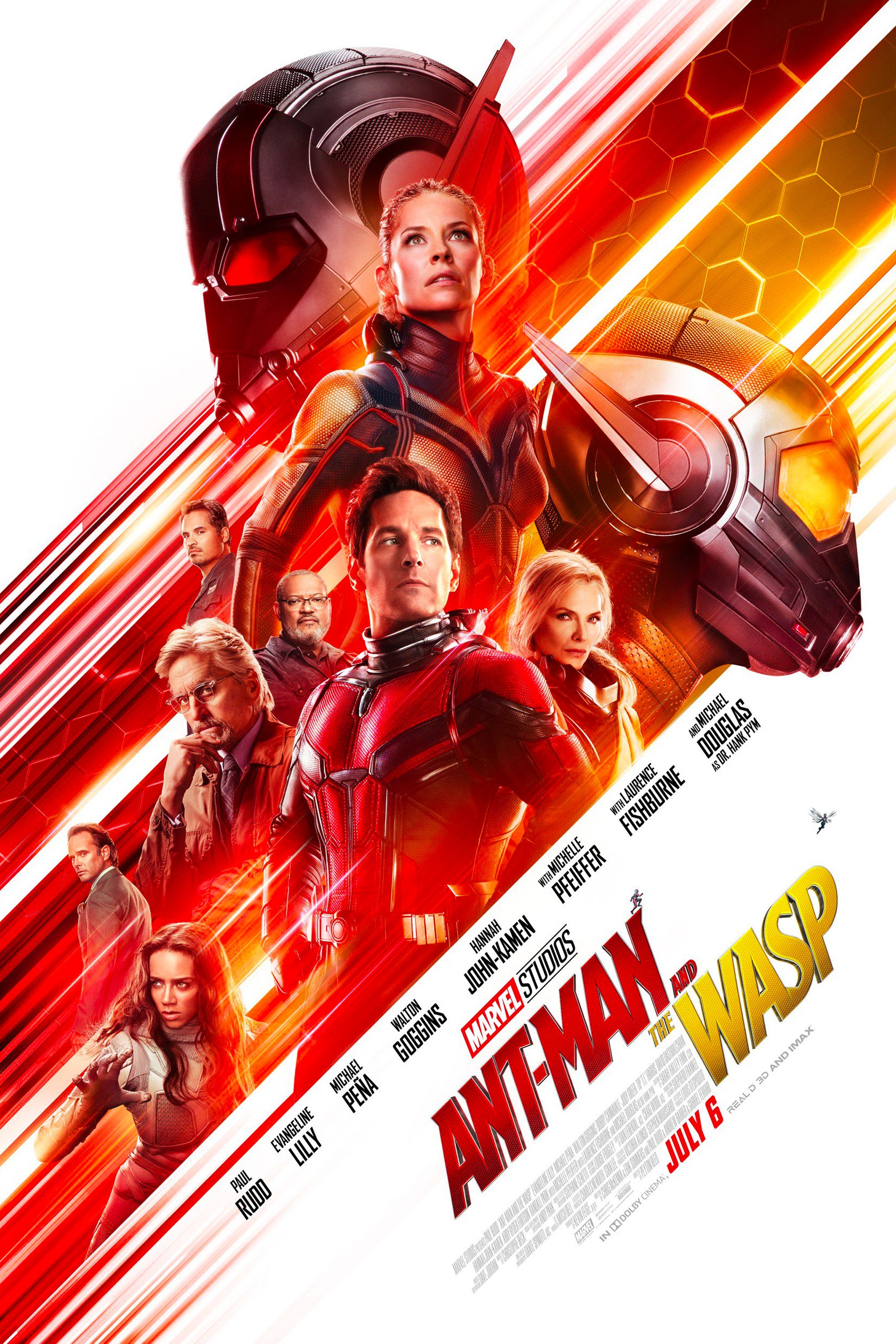Agents of S.H.I.E.L.D. Season 6 could be an essential tie-in to Avengers: Infinity War. Recent seasons of Agents of S.H.I.E.L.D. have abandoned the explicit tie-ins, but retained thematic ties to the larger MCU. When Doctor Strange introduced sorcery to the MCU, S.H.I.E.L.D. introduced Ghost Rider. Now, in Season 5, the series has taken on a cosmic edge just in time for Infinity War. But should the series be renewed for a sixth season, a far more direct tie-in could greatly benefit the MCU as a whole.
Agents of S.H.I.E.L.D. currently sits in "the bubble," with ABC unsure whether or not renew it. ABC boss Channing Dungey has said she's "cautiously optimistic" about the show's future, but the showrunners clearly aren't so sure. They've deliberately written a potential series ending, but still hope to continue the story. Infinity War - which Jed Whedon has said "opens a new playground" for the series - has the potential to give Marvel a strong pitch for a sixth season.
Marvel could easily take a tip from the comics. The comics typically operate in a cycle of Summer Events, which transform the entire franchise's status quo; the monthlies then explore the ideas set up by the Summer Event. Probably the best example was 2008's Secret Invasion, which ended with Norman Osborn replacing Nick Fury as head of S.H.I.E.L.D.. It opened up a year-long "Dark Reign," in which the world's heroes struggled to deal with this new, adjusted status quo. Infinity War is something like that; it radically changes the MCU's status quo, setting up a new context that really needs to be explored. Agents of S.H.I.E.L.D. could be the perfect tool to do that.
- THIS PAGE: INFINITY WAR'S CLIFFHANGER IS SIMPLY TOO BIG
Infinity War's Cliffhanger is too Big
Nothing has ever happened to the MCU like the cliffhanger ending of Infinity War. The scale of it is both horrific and breathtaking. Half of the human race has vanished from existence overnight - and it happened at random. Thanos cares nothing for occupation, wealth, skin color, tribe, language, or gender, meaning the disappearances will have been without rhyme or reason. Some nations will have lost their leaders, some teachers will have watched as their classes disappeared before their eyes, some mothers will have cradled their newborn children as they faded from existence. Planes will have lost their pilots, and dropped from the skies; cars will have crashed, driverless; emergency services will have been left in chaos. Some countries will fall to civil war, with uprisings and acts of attempted genocide. It's impossible to imagine the chaos.
And here's the catch; it's also impossible for Avengers 4 to do justice to that. We know that Thanos's actions will be undone; Marvel is about to start production on a sequel to Spider-Man: Homecoming, and both Doctor Strange and Black Panther are both expected to get sequels, too. While the opening scenes of Avengers 4 are sure to give a sense of how the world has changed, the movie will then move on. The scale of Thanos's horrific deed simply can't be realized on the big screen without sidelining the rest of the story.
RELATED: Overlooked Positives of Avengers: Infinity War's Ending
Compounding this problem is the way the Russo brothers have chosen to tell the story. The stakes may be cosmic in scale, but the Russos excel at character-driven plots. As a result, they only showed the disappearance of characters the viewers already had a connection with - heroes like Black Panther, Doctor Strange, and of course Spider-Man's emotional death. While that worked in terms of creating powerful character moments, it didn't demonstrate the scale of it all. That was left to a brief post-credits scene, one really concerned with setting up Captain Marvel. The Russos have always preferred a fairly tight focus on characters, and there's no reason to expect this to change in Avengers 4. As a result, the films themselves are unlikely to truly demonstrate the magnitude of Thanos's act.
Why Agents of S.H.I.E.L.D. Can Show Thanos's Impact
This provides Agents of S.H.I.E.L.D. with a unique opportunity. Other Marvel shows are largely insulated from the effects of Infinity War; the Marvel Netflix series have only just started dealing with the effect of Captain America: Civil War, Runaways stands apart from the wider MCU and has no real sense of how fast time is passing, and it's as yet uncertain when Cloak & Dagger will be set. But Agents of S.H.I.E.L.D. is roughly in sync with the MCU's overall chronology. 'All the Comforts of Home' referenced an Asgardian in the city, a clear nod to Thor: Ragnarok, and 'Option Two' referred to a situation in New York, clearly the opening scenes of Infinity War. More Infinity War tie-ins are coming.
That means Agents of S.H.I.E.L.D. is the perfect tool to explore the impact of Thanos's actions. For all S.H.I.E.L.D. is a spy series, its' central theme is really "family." Now imagine how that family would be torn apart by mysterious disappearances. Imagine if Coulson were caught up in this, erased from existence just when the team have managed to save his life. How would Simmons deal if Fitz crumbled to dust before her eyes - especially given there have been hints she's pregnant? And would Yo-Yo be able to find her moral center if Mack vanished? The show's episodic format is the perfect one to explore the psychological horror of what Thanos has done.
RELATED: Avengers: 40 Things You Completely Missed In Infinity War
What's more, Agents of S.H.I.E.L.D. could explore how this affects the world. Nature abhors a vacuum, and no doubt powerful forces would attempt to take advantage of the global chaos. Previous seasons have stressed that, to the public, "aliens" and "Inhumans" are conflated. No doubt a fresh wave of anti-Inhuman violence would sweep the planet, with some political figures seeking to unite humanity against the Inhumans. At the same time, the warping of reality could conceivably draw Robbie Reyes's Ghost Rider back into action.
The Russo brothers have tended to set their films in real-time, meaning Avengers 4 may well be set a year after Infinity War. If that's the case, Agents of S.H.I.E.L.D. is the perfect tool to explore how the MCU moved from Infinity War to Avengers 4.
How Much Can Agents of S.H.I.E.L.D. Be Influenced By Infinity War?
It's important to understand, though, that there are real obstacles to this approach. Firstly, it's unclear whether or not Marvel Studios and Marvel Television would actually be willing and able to coordinate to this degree. Back in 2015, Disney forced a corporate restructure that took Marvel Studios out of the wider Marvel Entertainment group. It's generally believed relations between the two groups haven't always been great. Even official tie-in comics became little more than comic book adaptations last year. However, there have been recent signs of improvement; Black Panther and Infinity War tie-in comics, for example, were actual original content, adding depth and context to the movies. If relations between Marvel Studios and Marvel Entertainment are improving, then this kind of tie-in might actually be possible. So the question is, would both parties see the benefit of it?
For Marvel Television, the advantages are enormous. Agents of S.H.I.E.L.D. Season 5 would be the ultimate demonstration that "it's all connected," given that the entire season would be exploring the impact of Infinity War. What's more, smart marketing would position the show as setting the scene for Avengers 4, making it feel like required viewing.
RELATED: Why Marvel TV Characters Won't Be In Infinity War (Or Any Upcoming MCU Movies)
At the same time, though, Marvel Studios may be wary. It's worth remembering that more people watch the films than the TV shows; the Russo brothers would still want Avengers 4 to feel self-contained, to be a complete story in its own right. Making matters worse, as Season 6 continues, it would inevitably draw closer to Avengers 4 - and thus reveal the shape of the MCU by that time. Marvel Studios would possibly prefer that to be kept a secret until the film's actual release.
Finally, there is one other subtle issue, one encountered by Marvel Comics many times. Some Summer Events are actually undermined to a degree by their tie-ins; the classic example is 2006's Civil War. The main series attempted to tread a careful path, avoiding taking sides with either Iron Man or Captain America. The tie-ins weren't quite so careful, though, and their stories essentially turned Iron Man into an outright fascist. It would take years for the comic book version of Tony Stark to redeem himself. While it's hard to imagine a similar issue affecting Infinity War and Avengers 4, the reality is that a tie-in series like this does involve Marvel Studios relinquishing a degree of control over how their movies are perceived. They may not be willing to take the risk.
For all these issues, though, the fact remains that the cliffhanger ending of Infinity War is unlikely to truly be done justice on the big screen. Agents of S.H.I.E.L.D. has traditionally been the ultimate tie-in TV series, and this is one occasion when a tie-in would actually add something powerful to the movie itself. Jed Whedon said that Infinity War "opens a new playground" for Marvel's Agents of S.H.I.E.L.D.. He's certainly got a point.

